
Stock image.
Quincy, FL— R.J. Reynolds Tuesday was hit with a $10 million total damage award for the role jurors found it played in the cancer that cost a Florida smoker his stomach. Harris v. R.J. Reynolds, 2014-CA-000387
The jury, in Florida’s Second Judicial Circuit, in Gadsden County, found Reynolds’ involvement in a conspiracy to hide the dangers of smoking helped hook Richard Harris to nicotine and led to his stomach cancer in 1992.
Tuesday’s verdict includes $4 million in compensatory damages and $6 million in punitives against the tobacco giant.
Harris started smoking as a 12-year old about 1944, and continued smoking at least a pack a day for 65 years. Doctors diagnosed Harris with stomach cancer in 1992 and removed most of the organ. Harris died about 2015 for reasons unrelated to the cancer.
The Harris family’s attorney, Richard Diaz, of the Law Offices of Richard J. Diaz, requested $9 million in compensatory damages during closings on Friday, and another $16 million in punitives during closings of trial on that portion of damages on Monday.
The case is one of thousands of Florida’s Engle progeny lawsuits against the nation’s tobacco companies. They stem from a 2006 Florida Supreme Court decision decertifying Engle v. Liggett Group Inc., a class-action tobacco suit originally filed in 1994. Although the state’s supreme court ruled that Engle-progeny cases must be tried individually, it found plaintiffs could rely on certain jury findings in the original case, including the determination that tobacco companies had placed a dangerous, addictive product on the market and had conspired to hide the dangers of smoking through much of the 20th century.
In order to be entitled to those findings, however, each Engle progeny plaintiff must prove the smoker at the heart of their case suffered from nicotine addiction that legally caused a specific smoking-related disease.
The seven-day Harris trial turned in large part on whether Harris was addicted to cigarettes and whether smoking caused his stomach cancer.
The defense contended Harris smoked by choice, not because of addiction, and despite being aware of the dangers of cigarettes. During Friday’s closings at trial over class membership and compensatory damages, Jones Day’s Bradley Harrison reminded jurors of testimony he said showed Harris successfully quit smoking in 2009, the first time he was truly interested in stopping. “Mr. Harris was a willing and voluntary smoker because he enjoyed it and wanted to do it,” Harrison said. “And you heard that at this trial from Mr. Harris, Mrs. Harris, and even plaintiff’s expert witness [on addiction], Dr. [Judith] Prochaska.”
Harrison also contended factors besides smoking likely caused Harris’ stomach cancer. Harrison noted evidence Harris had suffered from an H. pylori bacterial infection of the stomach, which he said was the leading cause of the cancer Harris developed. “He had an infection that put him at a 600-800 percent increased risk of stomach cancer,” Harrison said. “Plaintiff failed to prove that smoking cigarettes caused Mr. Harris’ stomach cancer.”
But Diaz argued the defense expert’s evaluation of Harris’ cancer was incorrect. Instead, he claimed Harris’ cancer began higher in the stomach, typical of smoking-related stomach cancer, rather than in the lower, or antrum portion of the organ, where the disease typically begins when caused by H.pylori. Diaz noted that doctors left only about 10 percent of Harris’ stomach, the antrum portion, when they operated. “If the cancer started in the antrum, if the cancer was from H. pylori, they would not have left the antrum there,” Diaz said. “That’s reason and common sense.”
And Diaz reminded jurors of evidence from both Harris and nicotine addiction expert Dr. Judith Prochaska, that Harris bore the hallmarks of an addicted smoker. Diaz noted Harris failed in many quit attempts and continued smoking even after his cancer diagnosis. “The evidence is overwhelming that Mr. Harris was addicted to nicotine from smoking,” Diaz said.
Email Arlin Crisco at acrisco@cvn.com.
Related Information
The Harris family is represented by Richard Diaz, of the Law Offices of Richard J. Diaz.
R.J. Reynolds is represented by Jones Day’s Bradley Harrison.
Not a subscriber?





